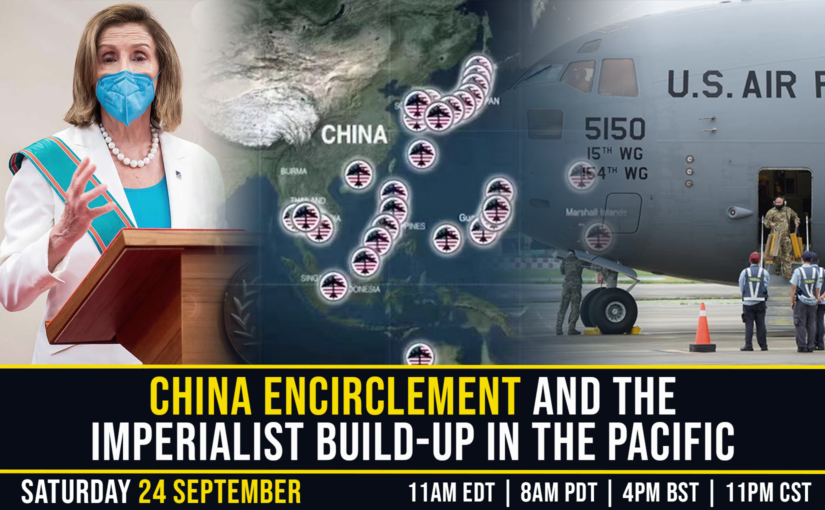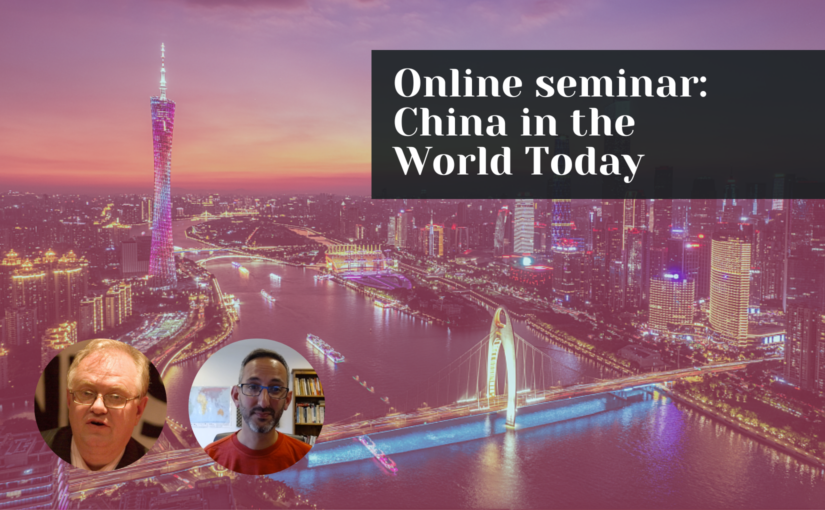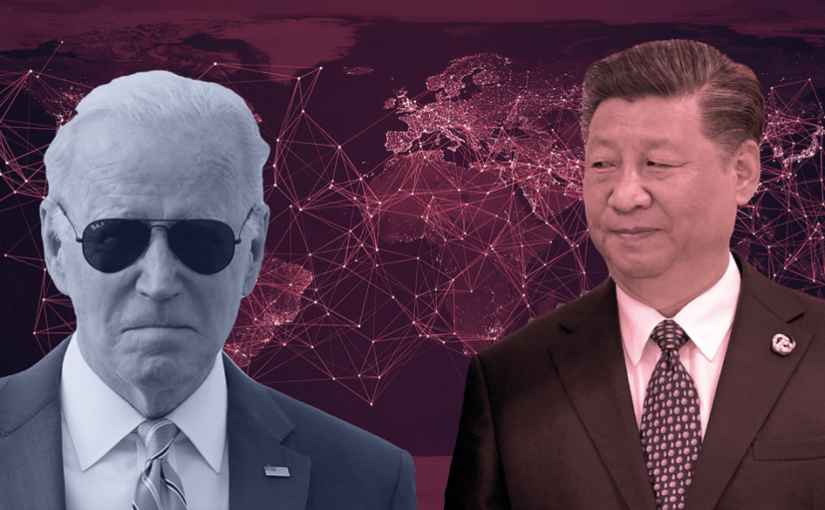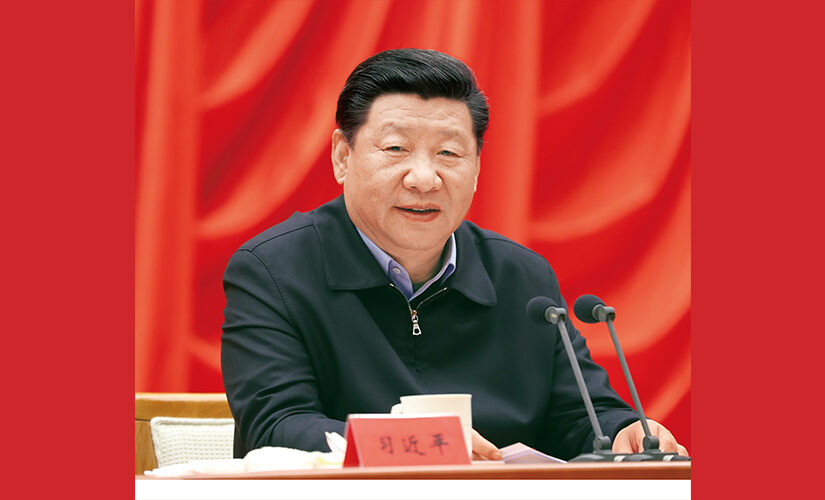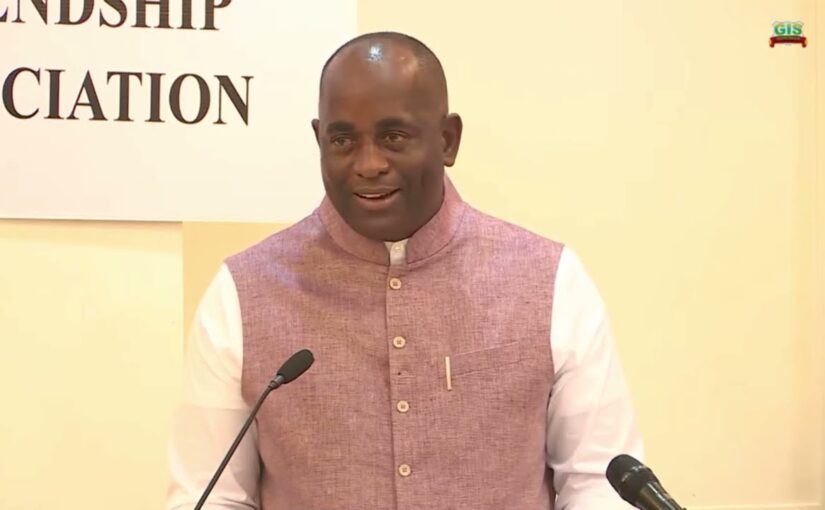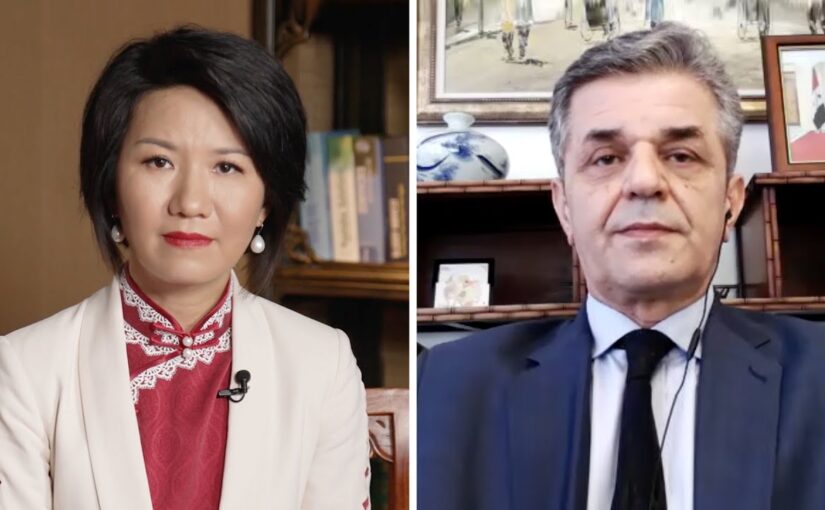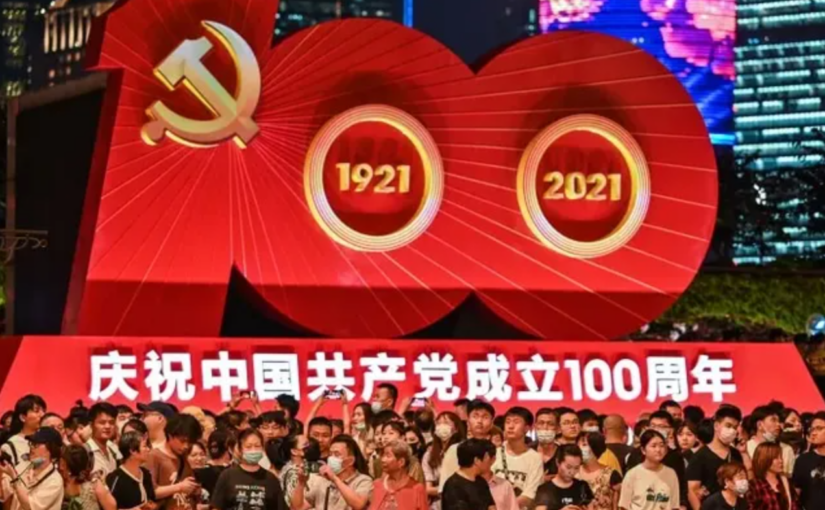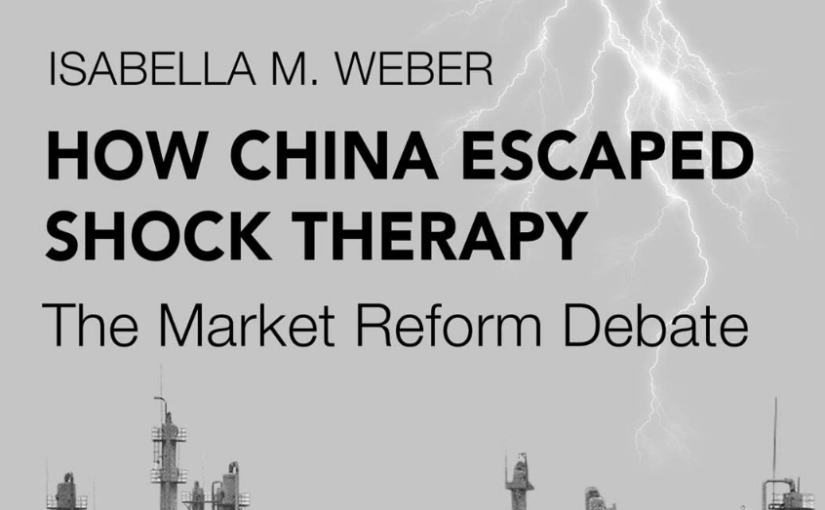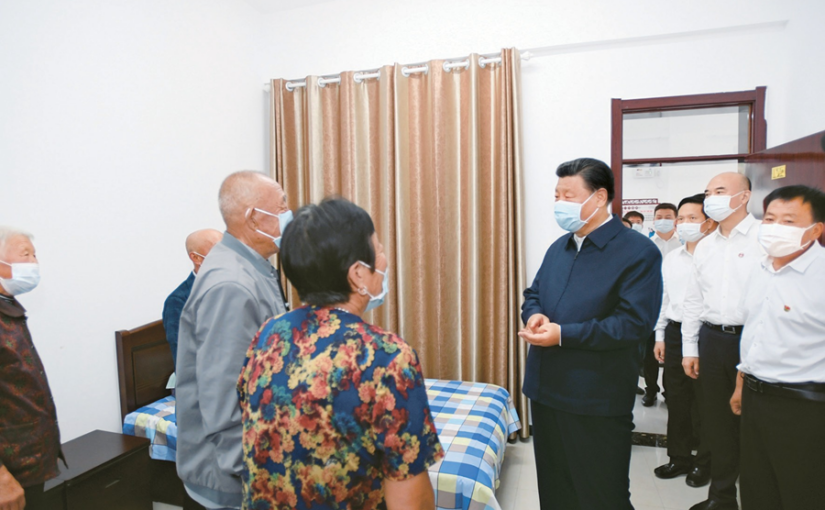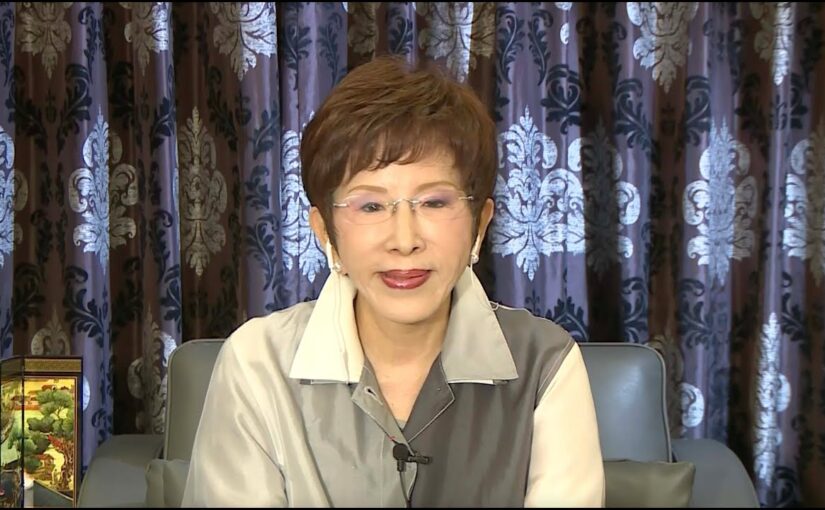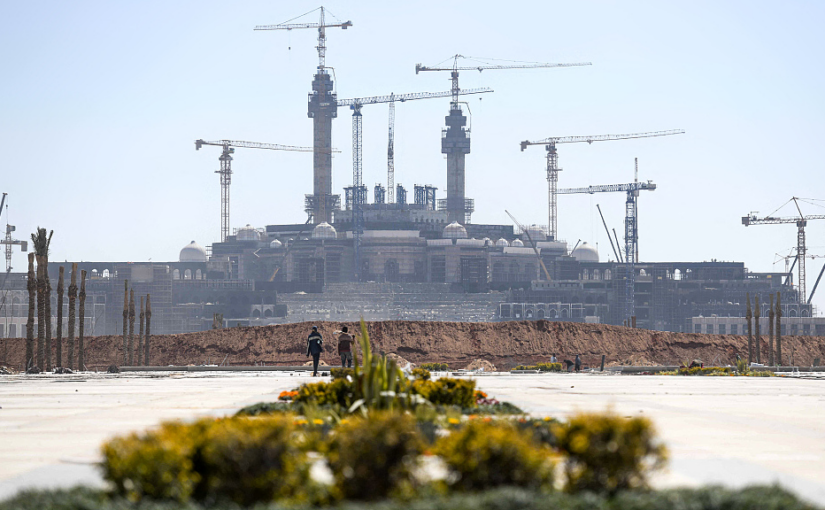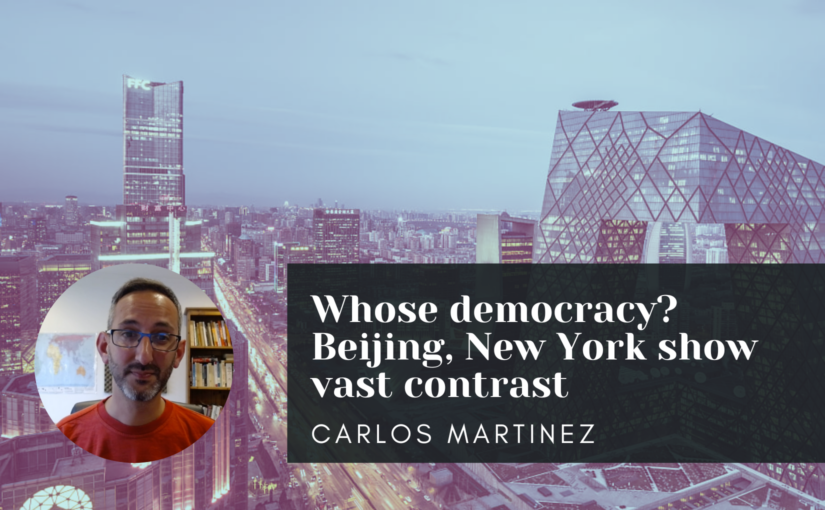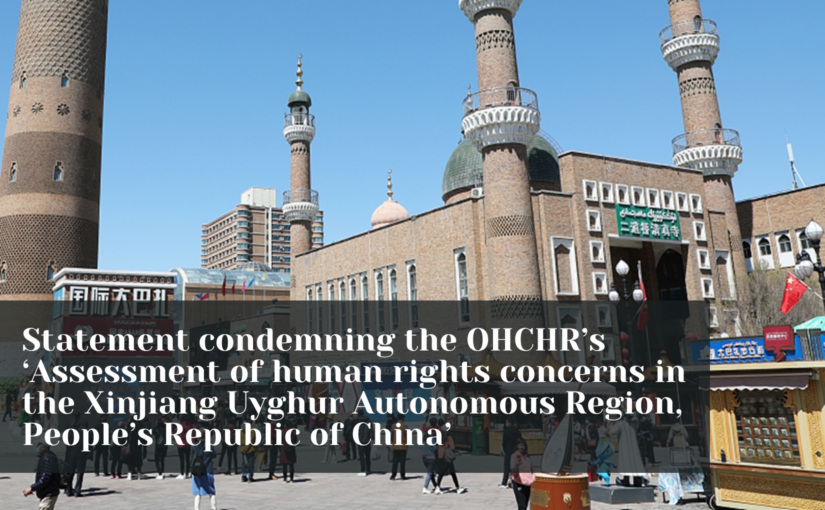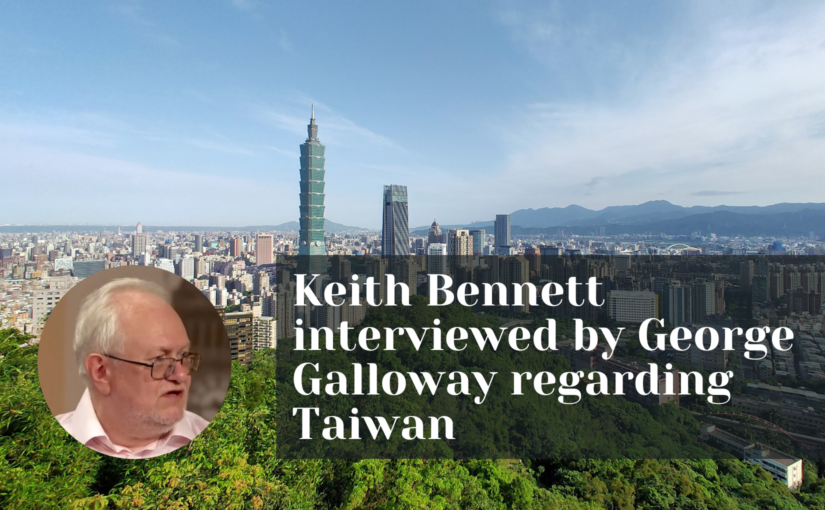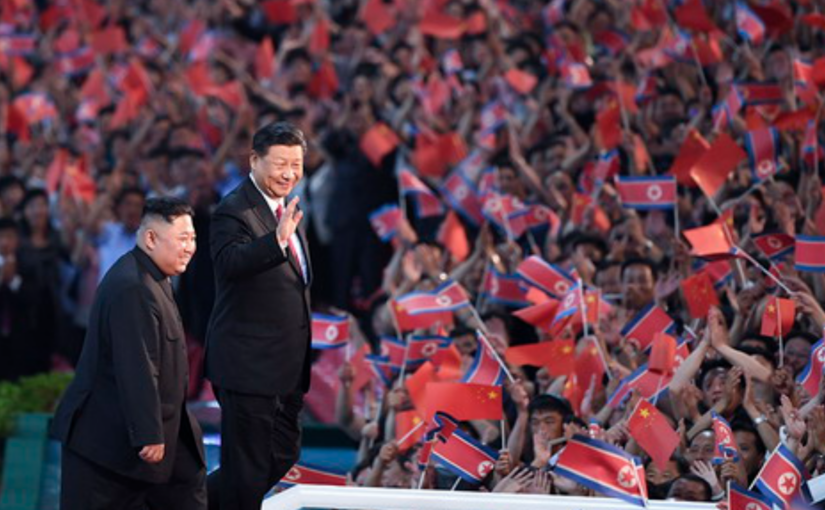On Saturday 24 September 2022, we hosted a webinar on the rising aggression of the US and its allies in the Pacific region. There were a number of excellent contributions dealing with issues including the Biden administration’s increased support for Taiwanese separatism; Western power projection in the South China Sea and the Taiwan Straits; the hysteria surrounding China’s security agreement with the Solomon Islands; the AUKUS nuclear pact; and developments in Korea and Japan. The event stream and the individual speeches are embedded below, and can be viewed directly on our YouTube channel.
Month: September 2022
Seminar: China in the World Today
Britain’s General Federation of Trade Unions (GFTU) initiated an autumn series of online seminars, under the theme The Bigger Picture, on September 15, by inviting Friends of Socialist China co-editors Carlos Martinez and Keith Bennett to introduce on the theme ‘China in the World Today’. Chaired by GFTU General Secretary Doug Nicholls, Carlos kicked off with a look at China’s domestic situation, focusing on poverty elimination and preventing climate catastrophe. Keith followed, addressing the questions of Taiwan and the relations between China, Britain, and the US. A lively discussion ensued, which could certainly have gone on for much longer.
Next events in the series will feature Dr. Francisco Dominguez, academic, activist and member of our advisory group, who will speak on the Decline of US imperialism on October 20; and our friend Dr. Kate Hudson, General Secretary of the Campaign for Nuclear Disarmament (CND), who will speak on NATO Friend or Foe on November 17. You can register for these events at The Bigger Picture: Autumn Series of Online Seminars – GFTU.
The GFTU is pleased to facilitate informed debate and critical thinking about many subjects in its education programme and the views of speakers and participants do not necessarily reflect those of the GFTU.
The US gets ready for war in Taiwan
In the following article, first carried in the Morning Star, Kenny Coyle details the “major reversal in US-China relations”, most recently highlighted by Biden’s unequivocal declaration that the US would commit its forces in the event of a military conflict between China and its renegade island province of Taiwan. This, Kenny explains, is “viewed with alarm in Beijing”, as it “increases the possibilities of a US-China war.”
The article outlines the key points of the three Sino-US joint communiques, noting how the second was swiftly undermined by the ‘Taiwan Relations Act’, and drawing attention to the ‘Taiwan Policy Act’, currently making its way through the US legislature. This would allow for an “enduring rotational US military presence” on Taiwan, something that the US has not maintained since 1979 when it established diplomatic relations with the People’s Republic. As Kenny rightly concludes, this “suggests dark days lie ahead.”
On Sunday 18 September, US President Joe Biden told the US news programme 60 Minutes that the US military would go to war in Taiwan should Chinese forces land on the island chain to enforce its sovereignty.
While China has never ruled out the last-resort use of military force, it has always insisted on its preference for peaceful reunification. Biden’s most recent comments repeat previous statements, including one made in Japan, Taiwan’s former colonial occupying power, in May. They are, however, the first since US house speaker Nancy Pelosi’s journey to Taipei in August which resulted in China holding major military exercises after her visit.
Pelosi’s meeting with the political leadership of Taiwan certainly enraged China and inflamed tension in the area. This was no diplomatic faux pas; it was the whole point of her trip.
An official visit by the third most senior politician in the US on a US Air Force special air mission Boeing C40 military jet emblazoned with US livery to a territory in which Washington does not have an embassy or a consulate was a deliberate provocation.
China got the message. Once Pelosi’s jet departed Taiwan’s self-declared air space, rejoined by her US Air Force escort, China announced a series of live-fire military drills around the main island of Taiwan and reaffirmed its declaration of sovereignty over the territories administered by the Taipei authorities.
Continue reading The US gets ready for war in TaiwanXi Jinping: Consistently develop and uphold Socialism with Chinese characteristics
With the Twentieth National Congress of the Communist Party of China scheduled to open on October 16, the party’s leading theoretical journal, Qiushi, has recently published an extract from an extremely important speech made by General Secretary Xi Jinping on January 5, 2018, at a seminar for new central committee members and other leading cadres.
Echoing the opening of Comrade Mao Zedong’s famous article, ‘Where do correct ideas come from?’, Comrade Xi asserts that, “Socialism with Chinese characteristics did not fall from the sky”, but rather is deeply rooted not simply in the four decades of ‘reform and opening up’, but in the whole history of the Chinese revolution and in the inheritance of 5,000 years of Chinese civilization.
He goes on to explain that the socialist revolution constituted, “the most extensive and profound social transformation in the history of the Chinese nation.” After the establishment of the basic socialist system, the Party has, “made a long-term exploration of how to build socialism in China and has made important achievements as well as experienced serious twists and turns. The main problem here is that building socialism in a semi-colonial and semi-feudal society like ours is an unprecedented undertaking, and there is no ready-made model to follow.”
Engels, he points out, noted that “‘the so-called ‘socialist society’ is not something that is set in stone, but should be seen, like any other social system, as a society that changes and reforms frequently.'” Socialism with Chinese characteristics has to be grasped, “in the course of the evolution of socialism in the world,” from Marx and Engels who turned socialism from an ideal into a science, to the October Revolution, which saw scientific socialism develop from theory to practice. Furthermore: “After the end of the Second World War, a number of socialist countries were born, especially our Party led the people to establish New China and the socialist system, which led scientific socialism from practice in one country to development in many countries. At that time, the socialist camp was flourishing, and together with the anti-imperialist and anti-colonialist struggles of Asian, African and Latin American countries, it formed a basically evenly matched pattern with the capitalist world, which is why Comrade Mao Zedong said that ‘the east wind overwhelmed the west wind.'”
However, historical development is full of twists and turns. Events in the late 1980s and early 1990s not only led to the collapse of the Soviet Union and the East European socialist countries, they also, “brought a serious impact on the vast number of developing countries that aspired to socialism, and many of them were forced to take the path of copying the Western system.”
Noting that the previous year had seen the 100th anniversary of the October Revolution, Comrade Xi explained, “I mentioned this major historical event at the beginning of the second part of the 19th Party Congress report in order to declare the historical impact of the October Revolution on the birth and development of the Chinese Communist Party. As Lenin profoundly pointed out in commemorating the fourth anniversary of the October Revolution, ‘this first victory is not yet final,’ but ‘we have already begun this enterprise. It does not matter when and for what period the proletarians of which country will carry this cause to its conclusion. What is important is that the ice has been broken, the voyage has been opened, the way has been shown.'”
Therefore, Xi notes, “The success of scientific socialism in China is of great significance to Marxism and scientific socialism, and to socialism in the world.” It is conceivable, he continues, that if the leadership of the CPC and China’s socialist system had also collapsed, then the cause of socialism as a whole could have been plunged into darkness. As it is, “Socialism with Chinese characteristics is becoming the banner for the development of scientific socialism in the 21st century and the mainstay for the revitalization of socialism in the world.”
The Chinese leader also addresses the question of the CPC being both a “ruling party” and a “revolutionary party”. He explains that those who assert that the party has transitioned from a revolutionary party to a ruling party are mistaken. They are not two distinct things. “We are communists and revolutionaries and should not lose our revolutionary spirit,” Comrade Xi notes, and continues: “Our Party is a Marxist ruling party, but at the same time it is a Marxist revolutionary party, and we must maintain the same vigor, revolutionary enthusiasm, and desperate spirit as in the past during the revolutionary war and carry out the revolutionary work to the end.”
This document has yet to be officially published in English translation. What follows is a machine translation from the Chinese original, received from the Dongsheng news group. As a result, it may contain some minor inaccuracies and should not be considered definitive. However, we are reprinting it on account of its great importance, rich content and timeliness.
When I met with Chinese and foreign journalists after the First Plenary Session of the 19th CPC Central Committee, I said that practice has proved that our Party is able to lead the people not only in a great social revolution, but also in a great self-revolution of the whole Party. Let me first make some comments from the perspective of social revolution.
Socialism with Chinese characteristics in the new era is the fruit of the great social revolution led by our Party and the continuation of the great social revolution led by our Party, and must be carried out consistently.
Both history and reality tell us that a social revolution often requires a long historical process to achieve ultimate victory. Only by looking back at the road taken, comparing the road of others, looking far ahead of the road, to figure out where we came from, where to go, many issues to see deep, accurate.
Continue reading Xi Jinping: Consistently develop and uphold Socialism with Chinese characteristicsWhy the US wants to destroy China and Russia: Nicaraguan President Daniel Ortega explains
We are very pleased to reproduce this key extract from an important speech by Daniel Ortega, President of revolutionary Nicaragua, with thanks to our friends at Multipolarista. As a multipolar world emerges, Comrade Ortega explains, the US is trying desperately to maintain its hegemony by attempting to destroy the Russian Federation, the People’s Republic of China and the economies of the European countries.
What harm, Ortega asks, has People’s China done to the United States or to the peoples of the world – to the peoples of Latin America, the Caribbean, Africa or Asia. What worries them rather is that China is providing benefits to these peoples, so the United States is losing its power to keep them enslaved.
Speaking on the day that US House Speaker Pelosi arrived in Taiwan, Ortega said that he was sure that the Chinese people, under the leadership of President Xi Jinping, have the strength, intelligence and experience to formulate the correct response that will further strengthen the People’s Republic and weaken US hegemony.
Amidst all these tumultuous events, the veteran Nicaraguan revolutionary leader points out, a new world is being born, something to which Nicaragua and its people are contributing their little grain of sand every day.
PM Roosevelt Skerrit at launch of Dominica-China Friendship Association
The following video, which we reproduce with thanks to our friends at Kawsachun News, features a warm and important speech by Prime Minister Roosevelt Skerrit of the Commonwealth of Dominica at the September 10 launch of the Dominica-China Friendship Association, attended by a galaxy of the country’s VIPs, including President Charles Savarin.
Prime Minister Skerrit hails the formation of the Friendship Association as a “most progressive move towards a deepening of already strong ties” between the two governments and peoples.
Roosevelt Skerrit is the third successive Prime Minister from the Dominica Labour Party. The first, Rosie Douglas, was a long-standing and good friend of the People’s Republic and Communist Party of China. Unfortunately, he tragically died on October 1 2000, from a heart attack, after just a few months in office, and before he could complete the work he had initiated of breaking the ties that the previous right-wing government had established with the Taiwan authorities. It fell to his close comrade Skerrit to take this step on March 23 2004.
In his speech, Skerrit notes that this decision has enhanced the lives of Dominica’s people – including in education, human resources, health care, agriculture and sports. China has also extended invaluable help in the face of two tropical storms and the global pandemic. He drew particular attention to the word friendship in the new association’s name. Friendship, the Prime Minister explained, means that you stand with your friends, especially in difficult times. He encouraged the association to issue statements of solidarity with China whenever the country is unjustly attacked.
China has proved itself to be key partner for African development
We are pleased to reprint the below article by Michael Olugbode, a journalist with the Nigerian newspaper, This Day, originally carried by People’s Daily Online.
Situating his argument in the context of the contributions of the great Pan-African and socialist revolutionaries Walter Rodney and Frantz Fanon, respectively from Guyana and Martinique, and their most famous works, How Europe Underdeveloped Africa and The Wretched of the Earth, Michael goes on to assert:
“It has been many decades since colonization ‘ended’ on the African continent, but the continent has not fully healed from this past trauma and continues to search for a path to continue from where its development was disrupted. Perhaps this search may have at last come to an end with the support of a country that had also once witnessed a dose of colonization and whose people has since healed from this inhumane history, having emerged from the ruins of colonization and wars to become the fastest growing economy on the planet. That country is none other than the People’s Republic of China.”
Outlining details of the multifaceted cooperation between China and Africa, he notes that the 10 plans that President Xi Jinping outlined at the 2015 FOCAC (Forum on China-Africa Cooperation) Summit in Johannesburg have been implemented in full, with the construction of numerous railways, highways, airports, ports and other infrastructure projects, and concludes:
“The facts are there for everyone to see that Africa has finally and gradually started moving towards a promising mode of development thanks to the fellow brother that China has proven itself to be.”
Modern science, and especially the latest archeological discoveries, has shown that the African continent is the cradle of humankind. Its people were developing slowly and steadily at their own pace until some external forces invaded the continent and carted away its able bodied men and women to strange lands where they were forced to toil for generations building the emerging economies of another continent.
Some have referred to this process as an exchange or perhaps a kind of trade, but could it be described as such when humans, treated like nothing but property, were exchanged for goods such as guns and gin. No wonder Walter Rodney, in reference to his book How Europe Underdeveloped Africa, argued that it was a combination of power politics and economic exploitation of Africa by Europeans that eventually led to the poor state of African political and economic development as became evident in the late 20th century. Although the author did not state his intention “to remove the ultimate responsibility for development from the shoulders of Africans… [He believes that] every African has a responsibility to understand the [capitalist] system and work for its overthrow.”
Similarly, Frantz Fanon’s The Wretched of the Earth provides insights into how the developmental strides of Africa were distorted. The psychiatrist provided a psychological and psychiatric analysis of the dehumanizing effects of colonization upon the individuals and the nations of Africa, and discussed the broader social, cultural, and political implications of establishing a social movement for the decolonization of a person and of a people.
It has been many decades since colonization “ended” on the African continent, but the continent has not fully healed from this past trauma and continues to search for a path to continue from where its development was disrupted. Perhaps this search may have at last come to an end with the support of a country that had also once witnessed a dose of colonization and whose people has since healed from this inhumane history, having emerged from the ruins of colonization and wars to become the fastest growing economy on the planet. That country is none other than the People’s Republic of China.
China has presented Africa with a way out of its constant state of underdevelopment by offering a friendly win-win international development springboard in the form of the Forum on China-Africa Cooperation (FOCAC). At the opening ceremony of the 2018 FOCAC Beijing Summit, Chinese President Xi Jinping quoted the observations of an ancient Chinese scholar, who stated that: “Only with deep roots can a tree yield rich fruit; only filled with oil can a lamp burn brightly.” Xi noted that history follows its own rules and logic, and that with a similar fate in the past and a common mission, China and Africa have extended sympathy to and helped each other throughout all the past years. He said: “Together, we have embarked on a distinctive path of win-win cooperation.”
“Marching on this path, China has followed the principle of sincerity, real results, amity and good faith and the principle of pursuing the greater good and shared interests. China has stood with African countries. Together, we have worked in unity and forged ahead,” said Xi.
The words of President Xi is the moving spirit behind the FOCAC. Since the 2015 FOCAC Johannesburg Summit, China has fully implemented the 10 cooperation plans adopted at the Summit. A large number of railways, highways, airports, ports and other infrastructure projects as well as a number of economic and trade cooperation zones have been built or are under construction. Mutual cooperation on peace and security, science and technology, education, culture, health, poverty reduction, and people-to-people exchanges has been deepened. The massive financing pledged by China has been either delivered or arranged to be delivered. These 10 cooperation plans have brought huge benefits to the African and Chinese peoples. They have fully demonstrated the creativity, rallying power and efficiency of China-Africa cooperation, and have lifted the China-Africa comprehensive strategic and cooperative partnership to new heights.
China has meanwhile promised to build an even closer-knit China-Africa community with a shared future in the new era. It has even gone a step further to launch an industrial promotion initiative and a China-Africa economic and trade expo in China to encourage Chinese companies to increase their investment in Africa, in addition to building and upgrading a number of economic and trade cooperation zones in Africa. China also has a plan to support Africa in achieving general food security by 2030, working with Africa to formulate and implement a program of action to promote China-Africa cooperation on agricultural modernization. China has continued to strengthen cooperation with African countries in local currency settlement and has made good use of the China-Africa Development Fund, the China-Africa Fund for Industrial Cooperation, and the Special Loan for the Development of African SMEs.
The list is endless. Every series of important cooperation plans proposed by China during each FOCAC Summit has been effectively implemented, which has provided a great boost to the economic and social development of Africa and which has been highly praised by the African people and the international community.
China-Africa trade and cooperation have both blossomed. A number of major Chinese-assisted infrastructure projects have been completed, including the Ethiopia-Djibouti railway, Kenya’s standard gauge railway from Mombasa to Nairobi, and Cote d’Ivoire’s Soubre hydropower plant. These projects provide much needed transport and energy infrastructure to help further develop local industries.
The facts are there for everyone to see that Africa has finally and gradually started moving towards a promising mode of development thanks to the fellow brother that China has proven itself to be.
Syrian Ambassador: Muslims in Xinjiang experience greater freedom than Muslims in the West
The below extract from CGTN’s popular The Point features an interview with Syria’s Ambassador to China, HE Muhammad Hasanein Khaddam.
Although relatively new in his ambassadorial role, this is his second posting to China. Broadcast on September 7, the ambassador was one of a group of diplomats from 30 Muslim majority countries who had recently paid a visit to Xinjiang. Describing the region as an oasis, Ambassador Khaddam said the gap between what they saw with their own eyes and what is presented in the west is unbridgeable.
However, this did not surprise him, as the same lies had been told about his own country during 12 years of war waged by terrorist groups and the western powers. Muslim people in Xinjiang, he pointed out, enjoy freedoms that can’t be enjoyed by their co-religionists in many western countries that criticise China.
Turning to the situation in Syria, the Ambassador notes that the Belt and Road Initiative (BRI), that Syria formally joined at the beginning of this year, brings hope of a new modality of ‘win win’, without dictation or disrespect. Companies from friendly nations that stood with Syria, he explains, will enjoy numerous opportunities in the reconstruction of the country, such as in the building of ports, roads, bridges and a railway to Iraq.
Why China isn’t capitalist
The below article by Stephen Millies was originally published by the US socialist journal Struggle/La Lucha. It is an interesting and provocative response to those comrades on the left who contend that capitalism has been restored in the People’s Republic of China.
Noting that China’s economy may already be larger than that of the United States, Stephen asserts that: “This tremendous economic growth is the result of China’s socialist revolution… You can’t explain China’s fantastic economic growth except by admitting there’s some other social system than capitalism in charge.”
An interesting aspect of the article is its presentation of how the Soviet Union, even in the late 1980s, played a major part in the liberation of southern Africa. It also notes that: “Sometimes retreats are absolutely necessary. For example, the Long March was a glorious retreat that saved the Communist Party of China from being destroyed.” In this context, Stephen also references Lenin’s New Economic Policy (NEP), along with an observation from Karl Marx that, following a socialist revolution, the working class might have to “buy off the band” of the wealthy.
Wall Street and the Pentagon view the People’s Republic of China as their number one enemy. China is the target of U.S. imperialism’s “Pivot to Asia.”
China’s economy may already be larger than the United States. The American Enterprise Institute―one of the best-known capitalist think tanks ― admits China surpassed the U.S. as the world’s biggest manufacturer back in 2010.
That’s historically significant. Factories in the United States exceeded Britain’s production in the 1890s.
China is now the “workshop of the world.” In 2021, China built nearly 17 million more motor vehicles than the U.S.
This tremendous economic growth is the result of China’s socialist revolution. It’s not just a matter of China making more than a billion tons of steel a year or having more miles of high-speed rail than the rest of the world.
When Mao Zedong declared “China has stood up” in 1949 and the People’s Republic of China was born, Chinese people lived to be, on average, just 36 years old.
By 2022 life expectancy had more than doubled to reach 77.3 years. That’s a longer lifespan than in the United States.
Despite these tremendous gains, some communists and revolutionaries contend that capitalism has been restored in the People’s Republic of China. They point to the 606 billionaires in China, including 67 in Hong Kong.
Continue reading Why China isn’t capitalistHow China escaped shock therapy in the 1980s: interview with Isabella M. Weber
The process of economic reform in China in the 1980s is not always well known or understood. ‘How China Escaped Shock Therapy: The Market Reform Debate’, published last year, is an important contribution to both understanding and debate. The first book by Isabella M. Weber, Assistant Professor of Economics at the USA’s University of Massachusetts Amherst, it won the 2021 Joan Robinson Prize, named for the renowned Cambridge economics professor and friend of socialist Asia.
The book details the complex debate that took place in China in the 1980s, which involved veteran Chinese leaders from the first generation of the revolution, young Chinese economists, Eastern European economists, and mainstream western economists from international financial institutions and elsewhere.
With the exception of the veteran revolutionary leaders, many of the participants in these debates were pushing a strategy which was to later become known elsewere as shock therapy. Their view did not prevail. Rather, what emerged was an “experimental and radical gradualist economic reform”, that drew from traditional Chinese economic statecraft, the leaders’ experience of hyperinflation before liberation, and the early results of the initial economic reforms in the countryside.
In this interview, originally published in the Czech language on Alarm, and then in English translation on the online East European socialist magazine LeftEast, Isabella expands on some of her book’s key themes. She notes that: “We have to remember that at that time China was unlike Czechoslovakia, Poland, or East Germany in that it was a very poor country. Mao’s reign laid important foundations for the economic reform, like basic healthcare system, public infrastructure, and industrialization, but nevertheless China was still a very poor country with a GDP lower than Sudan or Haiti. Of course, that doesn’t represent the whole level of development of the country, but it gives you a sense of what we’re talking about.”
Making a comparison to the economic reforms carried out in Russia from the end of the decade, Isabella describes this as an example of what was at stake for the Chinese. She draws a clear and very important distinction between the Chinese and Russian leaders and situations of the time:
“In the Chinese case in the 1980s the most powerful people in the leadership were first generation revolutionaries, so they approached the economic reforms with a very different perspective than Gorbachev or Boris Yeltsin. Another difference is that China started the reform coming out of the Cultural Revolution, which meant that at the beginning of the reforms the bureaucratic system was being re-established, whilst in the Russian case the bureaucratic system was very rigid.”
When today’s historiography refers to the debate about economic reforms in Eastern European countries during late communism, it often uses the term the “long transition”. It shows that the economic transformation from state socialism into neoliberalism was a process that took off in some of the countries in Eastern Europe in reaction to the oil crisis in 1973. Their debt was getting out of the control and it forced them to work more closely with Western financial institutions, but it also meant much deeper transformation of the world’s economic system with the end of the gold standard and Bretton-Woods economic system. Cooperation between Eastern European economists and Western financial institutions helped to shape the debate about the need for further economic transformation of state socialist economies. The most radical supporters of the neoliberal economic reform, later known as „shock therapy“, were influenced by Pinochet’s Chile or the military regime in South Korea. But at the same time, very similar debates over economic reform were taking place in China. Political economist Isabella M. Weber‘s astonishing new book How China Escaped Shock Therapy details the complex debate over economic reform in China in the 1980s between, on one side, young Chinese economists, Eastern European economists, and people from Western financial institutions that tried to push through “package reform“ (which would later be known as shock therapy), and, on the other, the old guard of the Chinese leadership who had first cut their teeth in the country. In the end, the latter group decided on their own experimental and radical gradualist economic reform that emerged from traditional Chinese economic statecraft, their experience of hyperinflation among during the Second World War, and the successful agrarian reforms of the 1980s. Why did the Chinese leadership decide that the neoliberal approach to economic reform was not an option for their country? We spoke with Isabella M. Weber, a political economist and assistant professor of economics at the University of Massachusetts Amherst and the Research Leader for China at the Political Economy Research Institute.
When did the debate about the need for economic reform start to appear in China and what was the driving force behind this push for economic reform?
The debate started after Mao Zedong’s death, but even in the last years of Mao’s reign there were already less official initiatives to rethink the communist project. It also coincided with China’s reapproachment with the USA, which marked a radical shift in China’s foreign relationships. I think that the year of Mao’s death was crucial. The transition period between Mao’s reign and Deng Xiaoping is often overlooked in the historiography of China’s reforms. To my mind this period marks a radical break with the ideas of Cultural Revolution. It was a shift from mass mobilization and revolutionary forms of social organization to a more developmentalist and economistic agenda, but initially this agenda was in the spirit of the “Big Push,“ a ten-year plan that involved importing foreign technologies and capital goods in exchange for Chinese oil, which was predicted to be discovered in larger quantities back then. The problem was that these projected findings of petroleum turned out to be inaccurate, so this plan imploded within the span of two years. So when Deng Xiaoping came into power it was clear that a new economic model was needed.
Continue reading How China escaped shock therapy in the 1980s: interview with Isabella M. WeberThe flaws in the “Assessment” report of the Office of the High Commissioner for Human Rights on China
In this important article, originally carried on Counterpunch, Alfred de Zayas, a former long-term United Nations employee, dissects the recent report of the Office of the (UN) High Commissioner for Human Rights on China’s Xinjiang region, which he believes, “should be discarded as propagandistic, biased, and methodologically flawed.” The report, he notes, was not mandated by the UN Human Rights Council, comes in response to pressures from Washington and Brussels, and forms part of their geopolitical hybrid war against China.
De Zayas draws a comparison with his own mission to Venezuela, prior to which he read all the relevant reports from the OHCHR, Amnesty International and Human Rights Watch. But when he fact-checked these on the ground, he saw a fundamentally different picture from that contained in reports by ideologues who had not been to Venezuela.
The author therefore writes that, “the questions must be raised whether and to what extent the Office of the High Commissioner for Human Rights and the Human Rights Council are operating in the service of Western interests, to what extent the human rights concerns of the rest of humanity are taken on board.”
On 31 August 2022, the last day of Michelle Bachelet’s 4-year tenure as UN High Commissioner for Human Rights, the Office released a 46-page document, which I believe should be discarded as propagandistic, biased, and methodologically flawed. This document, which was not mandated by the Human Rights Council and responds to pressures on OHCHR by Washington and Brussels, bears the superficially neutral title “ Assessment of human rights concerns in the Xinjiang Uyghur Autonomous Region”[1].
Already in June 2022, at the beginning of the 50th session of the Human Rights Council, China’s ambassador Chen Xu deplored the increase in “politicization” of the Council, reminding the members that “disinformation has become rampant, which seriously runs counter to the original purpose of the Human Rights Council.”
High Commissioner Bachelet did well in delaying publication of the Xinjiang “assessment” and returning to Chile before the unappetizing and destructive debates start during the forthcoming 51st session of the Council (12 September-7 October 2022). Already the Chinese mission has rejected[2] the “assessment” as unprofessional and incompatible with the end-of-mission statement issued by Michelle Bachelet after her successful mission to China and Xinjiang in May 2022, a statement, which I consider balanced, detailed and constructive[3]. Alas, Bachelet’s statement after her well-prepared visit did not succeed in silencing the Washington and Brussels critics that have been systematically misrepresenting the situation in Xinjiang and misusing it for purposes of their geopolitical hybrid war against China. Bachelet’s sedate statement was met by hostility, media mobbing and calls for her resignation.
Continue reading The flaws in the “Assessment” report of the Office of the High Commissioner for Human Rights on ChinaNYT scolds China for not ‘learning to live’ – or die – with Covid
In the below article, originally published by FAIR (Fairness & Accuracy in Reporting), Jim Naureckas takes the New York Times to task for yet another of its regular attacks on China’s highly effective Zero Covid policy. He notes that if the Chinese government had followed the same policies as its US counterpart regarding the pandemic, and got the same results, then four and a half million people would have died. As China did not follow the US example, the country has experienced 15,000 deaths – the majority from a spring 2022 outbreak in Hong Kong, which has a different medical and social system to the mainland. Meanwhile, the US has suffered more than a million Covid deaths – and with a current fatality rate of around 450 per day is set to lose around 160,000 more people this year if present trends continue.
Jim notes that nowhere in the New York Times article under review is there any comparison of the respective national death tolls or any hint that the USA’s life expectancy has now dropped below that of China. And whilst the article (like many others of its type in the western media) claims that China’s determination to suppress the virus has triggered an economic crisis, the author notes that in 2020, the first year of the pandemic, China’s economy grew by 2.4% while the USA’s shrank by 3.4%. The USA’s economy is projected to grow by 1.3% this year. However, Goldman Sachs projects 3.0% growth for China.
Four and a half million people.
That’s how many Chinese people would have died from Covid-19 had its government taken the same approach to the pandemic that the United States has taken, and gotten the same results.
Instead, China has had 15,000 deaths from Covid—most of these from an outbreak in the spring of 2022 in Hong Kong, which has its own healthcare system.
Meanwhile, the United States has lost more than a million people to Covid since the pandemic began. Deaths currently continue at the rate of about 450 a day, which would add up to roughly 160,000 a year if present trends continue.
Continue reading NYT scolds China for not ‘learning to live’ – or die – with CovidXi Jinping: Steadfastly following the Chinese path to promote further progress in human rights
We are very pleased to publish below the full text of Comrade Xi Jinping’s important speech on human rights. Comrade Xi delivered this speech to a group study session of the Communist Party of China’s Political Bureau, held on February 25 this year, which took as its theme the Chinese path of advancing human rights.
In his comprehensive exposition, the Chinese communist leader notes how the concept of respect and caring for others is deeply rooted in Chinese history and culture and that during the Western bourgeois revolution, Enlightenment thinkers advanced the concept of “natural rights”. Marx and Engels, he goes on to note, endorsed the historical value of such bourgeois theories, but “firmly refuted the theory’s denial of the social, historical, and class-based nature of human rights. ‘The individual,’ Marx pointed out, ‘is a social being.’… They envisioned that ‘In place of the old bourgeois society, with its classes and class antagonisms, we shall have an association, in which the free development of each is the condition for the free development of all.’”
Throughout its century of struggle, therefore, the CPC has always fought for the genuine human rights of the Chinese people. As a result, absolute poverty has been eliminated and a system of whole-process people’s democracy gradually developed, along with the world’s largest education, social security and health care systems. Human rights, Xi observes, “are not special privileges bestowed on some people or a small minority but universal rights to be enjoyed by all the people.” Moreover, “The advancement of human rights is a common undertaking of all humanity. In protecting human rights, all of us can always do better.”
In this context, he calls out the hypocrisy of the major capitalist countries, noting that, “Political polarization, wealth disparities, and racial tensions have all intensified, while racism, populism, and xenophobia have become rife, thus bringing human rights issues to the fore. Yet, these countries still use slogans like ‘universal human rights’ and ‘human rights over sovereignty’ as a pretext for forcing Western conceptions and systems of democracy and human rights on others and for meddling in the internal affairs of other countries. This has only served to cause recurrent military conflict, ongoing unrest, and the displacement of many from their homes in a number of countries.”
The speech was originally published in Chinese in issue 12 (2022) of Qiushi Journal, the CPC’s main theoretical organ. We reproduce it from issue 4 (2022) of Qiushi Journal’s English language edition.
Today, the Political Bureau of the CPC Central Committee is holding its 37th group study session, the focus of which is the Chinese path of advancing human rights. The goals of this session are to review our country’s human rights achievements, both theoretical and practical, in the new era, assess the international struggle in the sphere of human rights, and maintain steadfast commitment to the Chinese path to promote further progress in human rights.
It is the pursuit of all societies to protect the life, value, and dignity of every person and ensure their entitlement to human rights. Chinese culture has always stressed the importance of respecting and caring for others. From Confucius who declared that “benevolence has been the greatest priority of governance since ancient times” to Mencius who said, “Finding talents for the country is what benevolence is all about,” to Xunzi who believed that people were “most valuable” and Mozi who called on us to “love others as we do ourselves regardless of social status or wealth”—each of these great thinkers stressed the intrinsic value of the person. Our forebears also put forward other similar axioms: “Of all things in the world, people are most precious”; “To accomplish great feats, one must put the people first”; “In the matters of governance, the people should come first.” During the Western bourgeois revolution, the thinkers of the Enlightenment put forward the concept of “natural rights,” which holds that all men are created equal and possess inalienable rights, a concept that helped propel forward revolutions in Britain, America, France and other countries.
Karl Marx and Friedrich Engels endorsed the historical value of the bourgeois theory of human rights, meanwhile they firmly refuted the theory’s denial of the social, historical, and class-based nature of human rights. “The individual,” Marx pointed out, “is a social being.” He also argued that “Right can never be higher than the economic structure of society and its cultural development conditioned thereby.” Marx and Engels made the point that in a capitalist society “man has ceased to be the slave of men and has become the slave of things.” They envisioned that “In place of the old bourgeois society, with its classes and class antagonisms, we shall have an association, in which the free development of each is the condition for the free development of all.”
Continue reading Xi Jinping: Steadfastly following the Chinese path to promote further progress in human rightsLiu Xin interviews former Kuomintang leader
The below video features an extremely interesting and comprehensive interview with Ms. Hung Hsiu-chu, former Chair of the Chinese Kuomintang (KMT) party and current Chair of the Chinese Cyan Geese Peace Education Foundation, conducted by Liu Xin for her popular CGTN programme, The Point.
Speaking from Taipei in the aftermath of the visit by US House Speaker Pelosi, Ms. Hung presents a point of view that is almost never heard in the West – that of a Taiwan-born Chinese patriot. She makes clear that, in the wake of the visit and other western provocations, China will have to move from “fighting independence [of Taiwan] to boosting reunification in an enhanced manner.”
She slams the anti-China statement by the leaders of the G-7 countries and the EU High Representative following China’s response to the Pelosi visit, pointing out that this is simply a US-led bloc, all of whose members, with the exception of Japan, are members of NATO. She further notes that the G-7 did not reflect on the eastward expansion of NATO, which is the root cause of the Ukraine conflict. All Chinese, she explains, must join together to defend national sovereignty when the One China Principle is attacked, and the West should get over its centuries-old sense of superiority and treat others equally.
Ms. Hung speaks frankly about the decline in national sentiment among many young people in Taiwan but reiterates her absolute confidence in China’s eventual reunification.
The interviewer, Liu Xin is among the speakers at our webinar this Saturday, September 24, on China encirclement and the imperialist build-up in the Pacific – for which you can register using Eventbrite.
This is why the Arab world stands firmly with China
This article by Keith Lamb, first published in CGTN on 14 September 2022, describes the friendly relations between China and the Arab world, noting in particular that the Arab states have refused to support the West’s slanderous accusations in relation to human rights in Xinjiang. Indeed, numerous envoys from the League of Arab States have visited Xinjiang and spoken enthusiastically about the development of human rights in the region.
The author notes that imperialist apologists explain the above away on the basis that Arab states are somehow afraid of China; but surely it’s the countries which “committed carnage against the Arab world” that should be feared, not China, which “has not invaded a single Arab state and doesn’t maintain a myriad of military bases.”
Far from carrying out military aggression against the region, China is involved in extensive cooperation, trade and aid. “Where others have bombed, China builds.” The author observes that, last year, Iraq was the number one recipient of Belt and Road financing, receiving $10.5 billion; this sort of engagement compares favorably with the US-led genocidal war on Iraq. Meanwhile China is cooperating extensively with the countries of the region on cutting-edge technology, including in green energy, telecoms and AI. As Keith says, “this is not a new imperialism but a rejection of it.”
Those blinded by the “free” press believe China’s Xinjiang Uygur Autonomous Region is the location of a “genocide” against Chinese Muslims who are simultaneously “enslaved.” In contrast, envoys from the League of Arab States (LAS), who have been to Xinjiang, talk about China’s social and human rights achievements.
Those who screamed for violence against Arab states, including Libya, Iraq, and Syria, in the name of human rights, solve this cognitive dissonance by claiming that the Arab world is afraid of China. However, their delusion is only carried one step further to absurdity as clearly those who committed the carnage against the Arab world are the ones who should be feared.
In contrast, China has not invaded a single Arab state and it doesn’t maintain a myriad of military bases, which blurs the line between cooperation and occupation. If anything, considering the vast military power accumulated in the Middle East, the LAS support for China shows that they, despite lurking threats, will bravely stand up for truth so that “Weapons of Mass Destruction” lies can no longer be leveraged for the tyrants of war.
Instead, a new page of history is turning, which seeks to constrain the unilateral whims of a hegemonic bully. It is China’s peaceful rise and developmental philosophy contrasted with a fading unilateral order of violence, lies, and uneven development that leads the Arab world to stand with China today.
Continue reading This is why the Arab world stands firmly with ChinaVideo: Whose democracy? Beijing, New York show vast contrast
The video embedded below is the last in a three-part series on democracy made by China Daily, based on an interview with Friends of Socialist China co-editor Carlos Martinez. In this segment, Carlos talks about visiting both New York City and Beijing for the first time in 2019, and the stark contrast between the two cities. New York, in spite of being a major centre of wealth, contains terrible levels of poverty, inequality, homelessness and discrimination, and its infrastructure is collapsing. Beijing on the other hand is modern, efficient, clean and well-organised, and the fundamental human rights of all its citizens are guaranteed. What this small example reflects is the difference between Western democracy – a democracy for the elite – and Chinese socialist democracy, which works for the masses of the people.
Statement condemning the OHCHR’s ‘Assessment of human rights concerns in the Xinjiang Uyghur Autonomous Region, People’s Republic of China’
The following statement has been initiated by Friends of Socialist China. You can add your name as an individual signatory using Google Forms. Once you do so, your name will appear on this page within a few hours. Organizations wishing to add their signatures to this statement should contact us at info@socialistchina.org
We strongly condemn the publication by the Office of the High Commissioner for Human Rights (OHCHR) of its Assessment of human rights concerns in the Xinjiang Uyghur Autonomous Region, People’s Republic of China. In the words of former OHCHR lawyer and human rights expert Alfred de Zayas, this document “should be discarded as propagandistic, biased, and methodologically flawed.”
Based on substandard research methods and biased sources, the Assessment is completely lacking in credibility. It treats arms of the military-industrial complex such as the Australian Strategic Policy Institute (ASPI), along with professional anti-communists such as Adrian Zenz, as legitimate sources. Meanwhile the voices of Chinese NGOs, academics and individuals are suppressed, as are the numerous reports of diplomatic trips to Xinjiang – including by representatives of Muslim-majority countries – that have taken place in recent years.
The Assessment pointedly ignores China’s extraordinary progress in promoting the human rights of all ethnic groups in Xinjiang: in relation to poverty alleviation, social welfare, economic development, safety from terrorist attacks, and more. Instead, the document uses deliberately ambiguous language – that China’s actions “may” constitute crimes against humanity – in order to slander the People’s Republic of China whilst maintaining some plausible deniability.
It is highly suspicious that the Assessment makes no mention of then-UN Human Rights Commissioner Michelle Bachelet’s visit to Xinjiang in May 2022. Having visited a prison and spoken to former trainees at a vocational education and training center; having interacted with civil society organizations, academics, and community and religious leaders; Bachelet found no evidence of crimes against humanity. The numerous conversations she had do not form part of the data set for the Assessment.
What is the reason for the disparity between the OHCHR report and Bachelet’s end-of-mission statement? It is painfully obvious that the OHCHR has come under intense pressure from the US to bolster the credibility of the lurid slanders that have been thrown at China by Western politicians and journalists. Such propaganda forms part of the West’s imperial agenda of undermining China.
The OHCHR Assessment does a profound disservice to the cause of strengthening global human rights cooperation. The report does not enjoy a mandate from the General Assembly or the Human Rights Council, and it runs counter to the wishes and interests of the mainstream of the international community. A joint statement delivered by Cuba at the 50th session of the Human Rights Council in June this year stated its firm opposition to the “politicization of human rights and double standards, or interference in China’s internal affairs under the pretext of human rights”. This statement was signed by 69 countries, the overwhelming majority from the Global South.
Given the OHCHR’s relative silence in relation to persistent human rights abuses by the imperialist powers, it is impossible to avoid the conclusion that the Assessment is politically-motived, produced under pressure from the US, and designed to contribute to a dangerous, escalating New Cold War.
We call on the OHCHR to withdraw its Assessment, and we stand in solidarity with the people of China, subjected to abhorrent and baseless accusations.
Initial signatories (organizations)
- ANSWER Coalition
- Canadian Peace Congress
- China Network for International Exchanges
- Chinese Association for International Understanding
- Communist Party of Australia
- Communist Party of Bangladesh (Marxist–Leninist)
- Communist Party of Britain
- Communist Party of Canada
- Communist Party of Great Britain (Marxist-Leninist)
- Communist Workers League
- Freedom Road Socialist Organization
- Geopolitical Economy Research Group
- Ghana China Friendship Association
- Goldsmiths Anti-Imperialist Society
- Hamilton Coalition to Stop the War
- Institute for Independence Studies
- Instituto Simón Bolívar
- International Action Center
- International Manifesto Group
- La Città Futura
- Multipolarista
- Network in Defense of Humanity (Quebec chapter)
- New Cold War
- New Communist Party (Britain)
- Partido Comunista do Brasil
- Party of Communists USA
- Party for Socialism and Liberation
- Peace, Land, and Bread
- Popular Resistance
- Red Fightback
- Qiao Collective
- Socialist Unity Party
- South African Communist Party
- South African Peace Initiative
- The Canada Files
- Veterans for Peace – China Working Group
- Workers and Peasants Party Pakistan
- Workers World Party
- Young Communist League (Boston)
- Young Communist League (Britain)
Initial signatories (individuals)
- Kojo Amoo Gottfried (former Ambassador of Ghana to the People’s Republic of China)
- Roland Boer (Professor, Dalian University of Technology)
- Ben Chacko (Editor, Morning Star)
- Michael Dunford (Emeritus Professor, University of Sussex)
- Raymond Ferguson (National Secretary, Australia-DPRK Friendship and Cultural Society)
- John Foster (Emeritus Professor, University of the West of Scotland)
- Robert Griffiths (General Secretary, Communist Party of Britain)
- Kenneth Hammond (Professor, New Mexico State University)
- David Laibman (Editor Emeritus, Science & Society)
- Dee Knight (DSA International Committee member)
- Doug Nicholls (General Secretary, General Federation of Trade Unions)
- Dirk Nimmegeers (Editor, ChinaSquare.be)
- Ben Norton (Editor, Multipolarista)
- Suzanne Berliner Weiss (author and activist for social justice)
Individual signatories
| Name | Role/organization | Country |
|---|---|---|
| Niels Duus Nielsen | Denmark | |
| Michael Wongsam | Britain | |
| Simon Heim | Student | Hong Kong SAR, China |
| David Altimier | Professor, Political Analyst | Mexico |
| João Roque | Brazil | |
| C Larsson | ||
| TAN KIN LIAN | Singapore | |
| Peter Olech | Britain | |
| Stefania Fusero | Italy | |
| 高玮鸿 | China | |
| Ng Kong Hung | Singapore | |
| Christopher Helali | International Secretary of the CC of PCUSA | United States |
| JOSEPH PIETTE | Workers World Party | United States |
| Keith Heywood | Britain | |
| Mark Le | Canada | |
| Joe Lee | Australia | |
| Philippe Gendrault | PRCF | United States |
| Daniel J. Brown | Australia | |
| Lyn Neeley | Teacher AFT | United States |
| Régis Apolinário Coelho | Student/IFES | Brazil |
| Jakob Ulrik Munck | Denmark | |
| Steve Sweeney | Journalist | Britain |
| Dan Ross | Britain | |
| Gregory Dunkel | Retired, AFT2343 | United States |
| Nan Zhang | Canada | |
| Ng Sauw Tjhoi | Chief-editor “China Vandaag” | Belgium |
| Marie-France Germain | Canada | |
| Dakota | Indigenous man of Canada | Canada |
| Edward Owen Redmond | Britain | |
| Tony Kinder | University Researcher | Britain |
| Kim E Koo MD | United States | |
| Edward Owen Redmond | Britain | |
| De Maegd Frans | ARLAC (Solidarity with Latin America and the Caraibes). | Belgium |
| floyd gardner | veterans for peace | United States |
| Sue Haris | International Action Center | United States |
| juan donost | Mexico | |
| Matthew Louie | United States | |
| Man Lee | wenyahonline.com | Australia |
| Robin Stowe | United States | |
| Ann Logan | Retired book editor | Britain |
| CRISTOBAL CANO MOREY | Spain | |
| Joseph Thompson | Student | United States |
| William Murphy | Retired | United States |
| Jason Bowers | United States | |
| Michael Chia | Singapore | |
| Marcel | Brazil | |
| Alex Tan | Malaysia | |
| Roger Stoll | United States | |
| Pat Turnbull | Britain | |
| Stewart Kelly | concerned citizen | United States |
| Larry M Lee | Canada | |
| Lekx | Member-activist of grassroots movement Peace With Venezuela The Netherlands (Vrede Met Venezuela) | Netherlands |
| Mitchell Shore | Canada | |
| Dave Thomas | Chair Canadian-Cuban Friendship Association of Niagara | Canada |
| Maure | United States | |
| Doug Nicholls | General Federation of Trade Unions | Britain |
| Zhen Chi | China | |
| Peta Elmes | United States | |
| Peta Elmes | United States | |
| Victor Koppe | Lawyer (genocide specialist) | Netherlands |
| Jonn Mero | Norway | |
| Clinton Scott | Britain | |
| Vicente Castells | Britain | |
| James De Burghe | China | |
| Mark Charles Rosenzweig | United States | |
| Songyon Jing | China | |
| Stan Squires | Canada | |
| Alexander Reysenbach | Pensioner | Belgium |
| Bob Oram | Britain | |
| Daniel B | ||
| Pete Foley | Britain | |
| William Dere | Journalist and author | Canada |
| Wilhelm Reichmann | ||
| Chin K Seah | Canada | |
| Asfred Maldonado | Puerto Rico | |
| Brandon Miles | Independent Journalist | United States |
| Joe Herosy | United States | |
| Danny Li | United States | |
| Wilfred Jayasinghe | Sri Lanka Peace & Solidarity Council | Sri Lanka |
| Peggy Powell Dobbins | United States | |
| Elizabeth Smith | Canada | |
| Amrit | Canada | |
| Matthew Almonte | United States | |
| Edward Tripp | Retired | United States |
| Xiaoming Guo | Canada | |
| Stephen Paulmier | Hawai’i Friends of the Soviet People | Occupied country of Hawai’i |
| Iris Yau | Lecturer & Curator | Britain |
| Laurence Wright | ||
| RAFAEL QUEIROZ ALVES | Researcher | Brazil |
| Sandy Eaton, RN | United States | |
| Kate Lattimore | Britain | |
| Ben Lunn | Composer | Britain |
| Hank Keeton | Keeton Corporation | United States |
| BobAkamine | United States | |
| Mark Prenter | Australia | |
| Giles Geetooah | United States | |
| phoebe | Britain | |
| Demba Moussa Dembele | Economist | Senegal |
| Wei Weng LEONG | Singapore | |
| David Ayrton | Britain | |
| Ron Judd | New Zealand | |
| Youri Smouter | journalist & host of 1+1 at 1+1 hosted by Youri Smouter fmrley Yuri Muckraker at youtube | Belgium |
| Calla Mairead Walsh | United States, Canada | |
| Ping Hua | No Cold War Britain | Britain |
| Peter Rubin | United States | |
| Brishni Chattopadhyay | India | |
| Damien Marsic | China | |
| Bill Meyer | Michigan Peace Council | USA |
| Tom Wickham | Ireland | |
| Fabio Massimo Parenti | Associate Professor of International Political Economy | Italy |
| Michael Aw | Australia | |
| Bertil Carlman | Retired teacher | Sweden |
| Yick Foon WONG | Retiree | Australia |
| Arsenio Panuelos | Philippines | |
| David Lee | Australia | |
| Robert Fitzthum | ||
| Derek Blackmore | Britain | |
| James K Inkenbrandt | United States | |
| Matthew Campbell | United States | |
| Joris De Winter | Belgium | |
| Anna Eckert | United States | |
| B. Keith Brumley | United States | |
| David Müller | Switzerland | |
| Joe Montero | Australia | |
| Kevin Lindemann | United States | |
| Karen Aram | United States | |
| Kostas Kalogeropoulos | Researcher | Greece |
| Dr. Tamara Prosic | Researcher, Monash University | Australia |
| Jui Ching Ling | Netherlands | |
| Kevin Patrick Michael McCann | Communist Party of Britain | Britain |
| Antonis Balasopoulos | Cyprus | |
| Håkan Danielsson | Sweden | |
| Laura Wells | Green Party | United States |
| Ethan Evalobo | United States | |
| Derek Grigsby | Organizer / MECAWI ( Michigan emergency committee against war and injustice ) | United States |
| Iain Inglis | China | |
| Leo Collins | Ireland | |
| Michael Shane | United States | |
| ko ruijter | Netherlands | |
| Loo Wen Siang | Malaysia | |
| Siqlme Cqkft | Singapore | |
| Ruipeng Li | China | |
| Andre S | ||
| Jake Hemingway | United States | |
| Joseph Ostos | United States | |
| M. K. Brussel | United States | |
| Mike Shane | Communist Workers League (Fighting-words.net) | United States |
| Karen Li | Retired teacher | United States |
| Robert Laffin | United States | |
| Ray Gaston | Team Vicar Parish of Central Wolverhampton | Britain |
| Leonardo Bargigli | Università di Firenze | Italy |
| John Sharkey | Canada | |
| M. K. Brussel | United States | |
| Mushahed Ahmed | Member of the central committee, Communist Party of Bangladesh (M-L) | Bangladesh |
| Dilip Barua | General Secretary, Communist Party of Bangladesh (M-L) | Bangladesh |
| Miguel Figueroa | Canadian Peace Congress | Canada |
| Elisabeth Hills | United States | |
| Ruipeng Li | ||
| Eddy Sebahi | France | |
| Noah Berman | Britain | |
| Nino Pagliccia | Frente Hugo Chavez - Canada | Canada |
| eloi ramirez | United States | |
| kwok zu lim | Singapore | |
| Bobby Chen | ChinaRock.FM | United States |
| Cui Guowei | Chairman/Shaanxi Provincial Patriotic Volunteer Association | China |
| Hulun Buir Environmental Protection Volunteers Association | China | |
| Shaanxi Patriotic Volunteers Association | China | |
| Wang Junzhan | China Great Wall Society | China |
| Gansu NGO Network for International Exchanges | China | |
| Dragon Design Foundation | China | |
| 北京春晖博爱公益基金会 Chunhui Children's Foundation | China | |
| China Association for Promoting International Economic & Technical Cooperation | China | |
| China Arab Exchange Association | China | |
| Ken Stone | Treasurer, Hamilton Coalition To Stop The War | Canada |
| China Association for Promoting International Economic & Technical Cooperation | China | |
| China Arab Exchange Association | China | |
| Middle East Foundation for Peace Development | China | |
| World Digital Economy Forum Secretariat | China | |
| China Africa Investment and Trade Promotion Association | China | |
| Dragon Design Foundation | China | |
| Chunhui Children's Foundation | China | |
| Beijing Changier Education Foundation | China | |
| Novel Inception Foundation | China | |
| Enlai Foundation | China | |
| Beijing Crafts Council | China | |
| Beijing Hengji Health Management and Development Foundation | China | |
| Beijing NGO Network for International Exchanges 感谢! | China | |
| Charles Britz | United States | |
| Arnold August | The Canada Files | Canada |
| Michael Callura | Retired Steelworker | Canada |
| Kit Aislyn Haynes | Sigil | United States |
| Alias Hope | United States | |
| Farooque Chowdhury | ||
| John Considine | ||
| Clare Hariri | Britain | |
| Raymond Ferguson | National Secretary Australia-DPRK Friendship and Cultural Society | Australia |
| David Laibman | Editor Emeritus, Science & Society | United States |
| Peter Gose | Canada | |
| China Society for Human Rights Studies | China | |
| China Union of Anthropological and Ethnological Sciences(CUAES) | China | |
| Lijun Zhang | China Association of Ethnic Economy (CAEE) | China |
| Xiaohua Wu | Chinese Association For Ethnic Policy (CAEP) | China |
| China Ethnic Minorities’ Association For External Exchanges (CEMAEE) | China | |
| Minzu Unity and Progress Association of China(MUPAC) | China | |
| Russel Harland | Trade Unionist | Britain |
| Sara Barker | Canada |
Keith Bennett interviewed by George Galloway regarding Taiwan
Friends of Socialist China co-editor Keith Bennett was one of the panellists on a recent episode of Kalima Horra, a discussion programme hosted by George Galloway on Al Mayadeen television, discussing the current situation on Taiwan, the prospects for cross straits relations between the island and the mainland, and between China and the United States. The programme, recorded on August 13 but first broadcast on August 29, was occasioned by the provocative visit to Taiwan by US Speaker Nancy Pelosi at the beginning of that month.
Keith emphasised that whilst China would do everything possible to prevent war, its absolute determination to complete the cause of national reunification should not be underestimated. The United States was engaged in ‘salami slicing’ the One China principle, to which it had committed itself in three joint communiques, and China could no longer stand idly by.
We reproduce here Keith’s two main contributions to the discussion. The full programme, which also includes some valuable interventions from Professor Michael Dutton of Goldsmith’s, University of London and Beijing Capital Normal University, who stressed that both the Taiwan and Hong Kong issues are unresolved problems of colonialism, can be viewed here.
Imperialism and Taiwan
We are pleased to republish the following article from the latest issue of Socialist Voice, newspaper of the Communist Party of Ireland.
Graham Harrington outlines the history of imperialist meddling in the Taiwan issue, from the Dutch aggression in the seventeenth century through to the current instigation and backing of secessionist currents among the Taiwan authorities by US imperialism. Any so-called “independent Taiwan”, the author notes, would only meet the same cruel fate as Guam, Hawaii and Okinawa, namely that of a US military colony. In any event, he observes, this will never be allowed by the People’s Republic of China. Harrington concludes: “The desire of China’s people to reunify with Taiwan needs no justification for an Irish audience, given our own situation in a country partitioned by external forces.”
The recent visit of the speaker of the US House of Representatives, Nancy Pelosi, to Taiwan has sharply increased the prospect of war in the region.
The Chinese government and people strongly believe Taiwan to be their territory; and the no. 3 official in the US government visiting Taiwan is a clear provocation.
Taiwan was invaded by Dutch colonists in 1624, only to be repulsed in 1662 by the Chinese national hero Zheng Chenggong. Taiwan became a full province in Qing Dynasty China in 1885. Ten years later the then Qing government lost Taiwan in a war with imperialist Japan. The Japanese were sold weapons by the United States with which to do this.
After the surrender of the Japanese following the Second World War, the Republic of China continued its war against the Chinese communists, who would go on to defeat the nationalist KMT and proclaim the People’s Republic in 1949, thus bringing to an end the Chinese Civil War.
Efforts to defeat the remaining KMT forces on Taiwan were delayed by the US aggression in Korea, with hundreds of thousands of Chinese soldiers engaging American and other troops; and by the time the Korean War ended the United States had deployed forces to prevent the communists entering Taiwan. This would later increase to tens of thousands of US soldiers, and nuclear weapons, on the territory.
The present entity known as the “Republic of China” had China’s seat at the United Nations until 1971, when the People’s Republic was recognised by the international community as the true representative of the Chinese people, with even the United States opening diplomatic relations with the PRC in 1979—and, in the process, abandoning its military presence in Taiwan.
It was clear that the Taiwan authorities could not seriously claim to represent the Chinese people. Their case only weakened further after China’s “Reform and Opening Up” led to its economic boom and corresponding improvement in the PRC’s global standing. Taiwan remained a dictatorship under the KMT until the late 1980s, with underlying tensions between the mainland KMT elite who arrived in 1949 and those who had emigrated from Fujian province over the centuries. During its rule the KMT brutally suppressed communists and leftists.
Continue reading Imperialism and TaiwanXi Jinping sends message to Kim Jong Un on DPRK National Day
September 9 this year marks the 74th anniversary of the founding of the Democratic People’s Republic of Korea (DPRK), China’s socialist neighbor. Marking this occasion, Chinese leader Xi Jinping addressed a warm message to his DPRK counterpart Kim Jong Un. As a good comrade, good neighbor and good friend, Xi expressed China’s support for the further development of the DPRK’s socialist cause, noting that China-DPRK friendship has won great public support.
The below report was first carried on the website of the Chinese Foreign Ministry.
On September 9, 2022, General Secretary of the Central Committee of the Communist Party of China and President Xi Jinping sent a congratulatory message to Chairman of the Workers’ Party of Korea (WPK) and Chairman of the State Affairs Commission of the Democratic People’s Republic of Korea (DPRK) Kim Jong Un on the 74th anniversary of DPRK National Day.
Xi Jinping pointed out that for the past 74 years, the DPRK people have closely united around the WPK and forged ahead to obtain great achievements in the socialist cause. In recent years, under the guidance of the guidelines and policies made at the 8th WPK Congress, the DPRK people have continuously made new achievements in economic development and improvement of livelihood, and succeeded in fighting the COVID-19 pandemic. We are wholeheartedly happy with it as a good comrade, good neighbor and good friend. I believe that under the leadership of Comrade Chairman and the WPK, the brotherly DPRK people will surely promote the socialist cause of the DPRK to achieve new development at a new level.
Xi Jinping pointed out that China and the DPRK are linked by mountains and rivers, and the traditional friendship is long-standing and steadfast. Comrade Chairman and I have reached a series of important consensus on planning the blueprint for the development of relations between the two parties and between the two countries and enriching the connotation of the China-DPRK friendship in this era. The China-DPRK friendship has won great public support, the exchanges and cooperation between the two countries have continuously been advanced, and the two sides have supported each other on issues of major concern, demonstrating the vitality of the traditional China-DPRK friendship.
Xi Jinping emphasized that changes unseen in a century are accelerating, and the world is entering a new period of turbulence and transformation. The Chinese side is ready to work with the DPRK side to maintain strategic communication, strengthen coordination and cooperation, and jointly uphold, consolidate, and develop China-DPRK relations, to bring more benefits to the two countries and the two peoples, and make contributions to peace, stability, development and prosperity in the region and the world.
